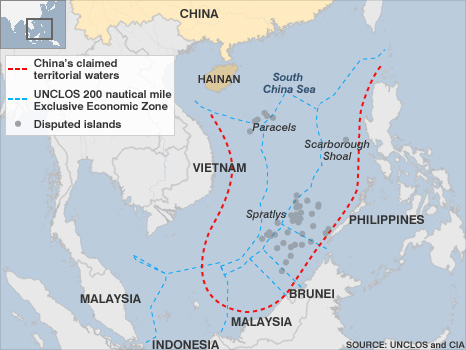SOURCE: Sunday Times Newspaper in Sri Lanka
Chinese Fishermen Are The Front Line In Island Disputes
 |
| The red dotted line represents China's exclusive economic zone and in some cases territorial sea claims and now appears on Chinese pass ports. If a Chinese fisherman carrying a Chinese passport is detained by fisheries authorities of Vietnam, Indonesia, Malaysia Brunei, or the Philippines they can whip out an official pass port that clearly depicts Chinese ownership right up to its across the China seas neighbor's beach line. The blue lines by contrast represent the internationally recognized EEZs which recognize China's claim to some of the Paracels which are shared with Vietnam, and none of the Spratlys which they have already garrisoned, and certainly none of Scarborough Shoal. This is nothing but a bald faced lie on the part of China but one told to its people in a moist official sounding manner. It works to a degree. Put your self in the position of say a Philippine judge hearing a fisheries violation case against a Chinese crew. Are you really going to throw the book at a bunch of poor fishermen who believe in good faith based on official documents of their own government that they are within their rights? Given that China has the superior naval force and is presently garrisoning one of your islands and doing a lot of saber rattling, are you looking for an opportunity bring things to a head or do you defer to your own military and state departments? China is using its humble fishermen as front line troops in the biggest territorial conquest in 70 years. |
TANMEN, China, March 6, 2013 (AFP) - The tropical waters of the South China Sea are among the most contested on Earth, but Chinese fishermen who sail in them shrug off the dangers of navigating between multiple competing claimants.
“It's a little risky... but in Chinese regions we're not afraid, we're in sea which belongs to us, how could we be arrested?” asked Liang Min, 29, as he stood in his ship's dank engine room, wearing yellow plastic shoes.
It is a sentiment that would be disputed in several Asian capitals, and as tensions mount in the area Liang risks finding himself embroiled in an international incident on one of his regular visits. Beijing says its “historical waters” include a vast swathe of the South China Sea, detailed on a map published in the 1940s. The “nine-dash line” that marks its declared rule sweeps almost to the coast of Borneo, over 1,000 km from the Chinese mainland, and provoked fury when it was included in new Chinese passports issued last year.
In his address opening China's parliament this week, Premier Wen Jiabao said Beijing should “develop the marine economy... and safeguard China's maritime rights and interests”.As China presses its claim it has increased its naval and marine surveillance presence, as have its southeast Asian neighbours, who cite international conventions to strongly deny Beijing's authority -- raising fears of open conflict.
“The sea belongs to us, our ancestors fished there,” said an elderly boat owner surnamed Wang in Tanmen, a run-down but bustling port on China's island province of Hainan, where ships offload catches of octopus, sailfish and mackerel.His words echoed reports in Chinese state media saying Chinese fishermen have been active in the area since the Han Dynasty, which began in 206 BC.
A third of the world's seaborne trade passes through the South China Sea, and it could hold enormous reserves of oil and natural gas.But for the fishermen of Tanmen, its strategic significance pales in comparison to the attraction of its rich marine stocks.So many fish shoal around the Paracel islands -- which are claimed by China, Vietnam and Taiwan -- that Liang said he and his crew dive down to coral reefs at night to grab creatures as they sleep.
For others the Spratlys, a motley collection of reefs and islets disputed by the three Paracel claimants plus the Philippines, Malaysia and Brunei, are the biggest draw.
LINK TO FULL STORY: http://www.sundaytimes.lk/analysis/31030-chinese-fishermen-on-front-line-of-marine-dispute-by-tom-hancock.html
No comments:
Post a Comment